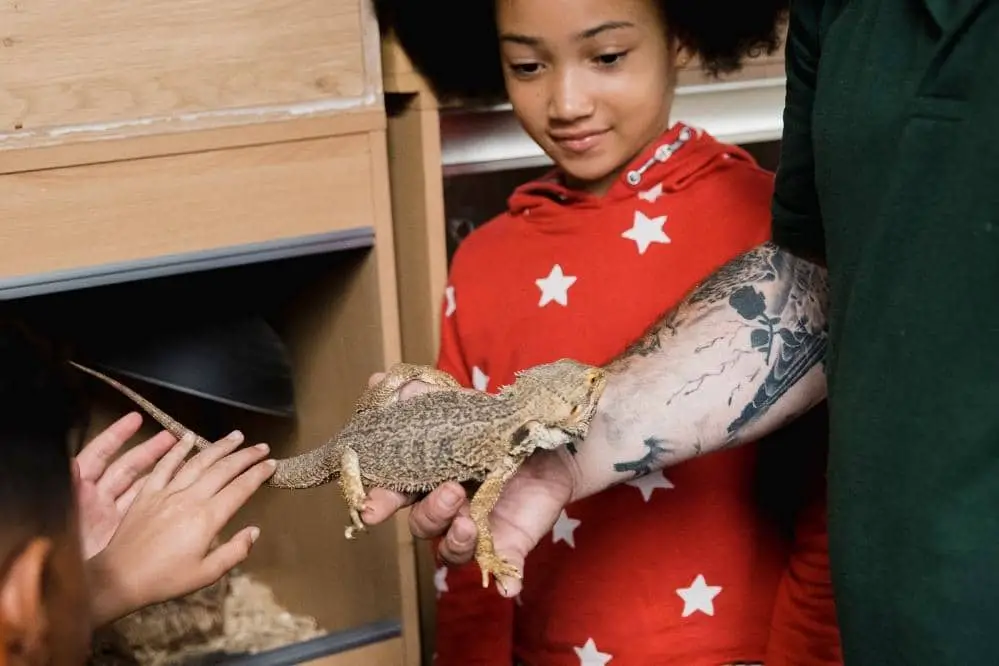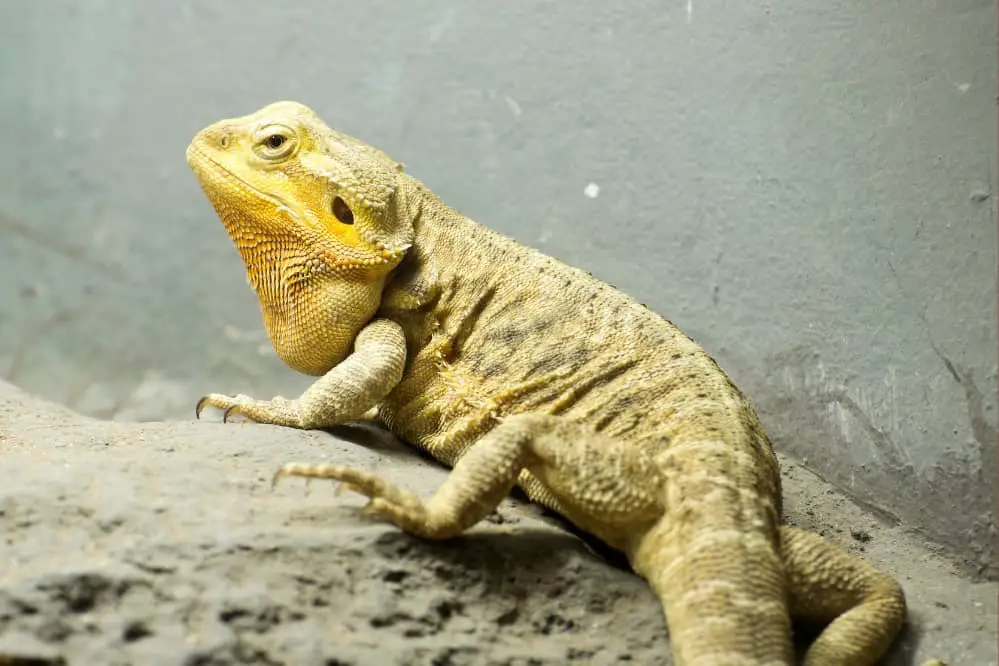All loving and caring pet parents love to pet, snuggle, hug and kiss their pets. However, if you own a bearded dragon, things are slightly different. It is not recommended to kiss your bearded dragon because you could get salmonella poisoning from doing so, and salmonella infection is something that you can’t take lightly. Salmonella is prevalent in the feces of bearded dragons and may be found all over their bodies, even if they seem clean. When handling bearded dragons, good hygiene standards must always be practiced.
Children, the elderly, and people with a weak immune system are more likely to get sick, but everyone is at risk, so you should pay special attention to this aspect of beardie ownership. Though kissing your bearded dragon may seem like a nice way to express devotion and love, it is not worth the danger of disease.
How Do Bearded Dragons Actually Spread Salmonella?
Salmonellosis is a zoonotic disease, which means that it can easily spread from animals to people. The disease is caused by a bacterium named “Salmonella,” and these bacteria can be found in small numbers in the intestines of many pet animals like cats and dogs, reptiles, and even humans. However, the bacterial load in the intestine of these animals is not very high and doesn’t cause any harm or don’t make them sick.

On the other hand, bearded dragons naturally contain a comparatively higher load of salmonella in their digestive system. Though bearded dragons don’t get sick due to salmonella generally, they shed these bacteria in their feces which can be transmitted to humans while handling or kissing the bearded dragon.
How Does Salmonella Transmit From A Bearded Dragon To A Human?
Many owners may believe that since they are cleaning their beardie’s tank on a regular basis and there are no feces on the tank’s floor, there is no risk of salmonella transmission, so they are free to kiss their beardie as much as they want.
If you are also one of such owners, you are totally mistaken. Even if the tank and your bearded friend seem clean, the bacteria can be present on their bodies and anything in the environment in which they live and roam. Your bearded dragon can carry salmonella bacteria on its body in many different ways. Here are the three most common ways bearded dragons can carry salmonella:
1. Eating Feces Directly
Even though it sounds gross, many bearded dragons eat their own poop. This is entirely normal and, in many cases, a natural instinct for survival. This means that your bearded reptile has salmonella bacteria on its face, and if you kiss him, you will come in contact with the bacteria and may have to face serious health issues. Bearded dragons often eat their own waste for two main reasons:
- They have undigested food in their poop.
- Their diet is deficient in vitamins and minerals.
If your bearded dragon has food in its feces that it hasn’t digested yet, it will often go looking for it, picking out bits of crickets and whatever else it can find. It can also mean that they aren’t getting enough essential nutrients in their food, and bearded dragons will often try to get as much nutrition as possible from their poop to fulfill their nutritional needs.
2. Going Through The Poop
Bearded dragons likely transmit salmonella to their owners by running through their feces. As you may guess, this is rather simple to do, and the majority of bearded dragons will not avoid their feces while moving around in their tanks. Many things will directly influence the possibility of their having feces on their feet, tail, and body. These factors include:
- How frequently do they defecate
- How often do you clean the tank?
- How energetic are they?
- The size of the tank
The chances of bacterial transmission from beardies to humans are more if your bearded friend defecates more than usual, you don’t clean the tank as often as it should be, your bearded friend like to roam about, and the tank’s size is smaller than recommended.
3. Pooping In Their Feed And Water Bowls
People often don’t think about the fact that your bearded dragon could poop in their food or water bowls. This can happen in many ways, and most of the time, no one notices. Bearded dragons can get poop on their food and in their water bowls in the following ways:
- Taking a dump right on their food
- Getting poop on their food by walking
- Using their water bowl as a toilet
Do All Bearded Dragons Carry Salmonella?
It would be difficult to determine whether all bearded dragons have salmonella in their poop unless every beaded dragon goes through blood or fecal testing. Therefore, the Centers for Disease Control and Prevention (CDC) have said that bearded dragons are a high risk for carrying salmonella. Because of this, it is best to assume that all bearded dragons have salmonella and to handle them in a clean way so that you can spend time with your beardie without worrying about getting sick.

At this point, it’s important to remember that it’s not only bearded dragons that carry salmonella; even cats and dogs are among the pets that could carry salmonella. So, as long as you keep good hygiene, you should not be afraid to handle or own bearded dragons or other reptiles in general.
What Precautions Should I Take To Ensure My Safety And Hygiene When Handling My Bearded Dragon?
In spite of the fact that your bearded dragon may be harboring salmonella, it’s not like you are unable to handle or care for your bearded reptile. When it comes to the care and handling of your bearded dragon, if you adhere to the sanitary handling guidelines mentioned below, you can enjoy handling and play with your bearded friend.
- Immediately wash your hands after touching anything.
- Avoid eating while you are working.
- It is important that you do not let your bearded dragon walk on your face (in case this happens, wash immediately)
- Do not kiss
- Never use kitchen sink to bath or wash your bearded dragon’s body and other accessories; because your utensils can pick bacteria from the sink latter on.
- When you are holding anything, avoid touching your face.
- Always keep an eye on the youngsters; if they like to handle the beardie, make them understand how critical it is to follow the above instruction too.

